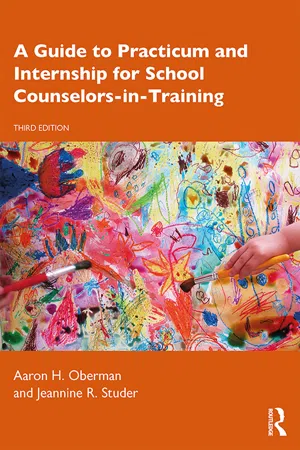
A Guide to Practicum and Internship for School Counselors-in-Training
- 274 pages
- English
- ePUB (mobile friendly)
- Available on iOS & Android
A Guide to Practicum and Internship for School Counselors-in-Training
About this book
The ideal resource for school counseling field experiences, the updated and expanded third edition of A Guide to Practicum and Internship for School Counselors-in-Training covers all aspects of the practicum and internship experience from the initial contact with supervisors to detailed descriptions of students' different roles.
Readers will gain an awareness of school culture and the understanding needed to develop an individualized philosophy of school counseling. Each chapter contains activities, case studies, worksheets, and images to facilitate understanding, and all material is consistent with both the Council for Accreditation of Counseling and Related Educational Programs (CACREP) 2016 Common Core and School Counselor Entry-Level Specialty Areas and the school counselor standards identified by the American School Counselor Association (ASCA). Specific focus is given to strategies for implementing the ASCA National Model (4th edition) as a part of clinical experiences.
This text can be used by faculty, students, and supervisors alike to support and enhance the school counseling knowledge base used to meet the needs of all students.
Frequently asked questions
- Essential is ideal for learners and professionals who enjoy exploring a wide range of subjects. Access the Essential Library with 800,000+ trusted titles and best-sellers across business, personal growth, and the humanities. Includes unlimited reading time and Standard Read Aloud voice.
- Complete: Perfect for advanced learners and researchers needing full, unrestricted access. Unlock 1.4M+ books across hundreds of subjects, including academic and specialized titles. The Complete Plan also includes advanced features like Premium Read Aloud and Research Assistant.
Please note we cannot support devices running on iOS 13 and Android 7 or earlier. Learn more about using the app.
Information
Part I
The Practicum and Internship Journey
1 Getting Started in Your Clinical Experiences
CACREP Standards
Foundations
- history and development of school counseling
Chapter Objectives
- provide an understanding of the school counseling practicum and internship experiences
- describe clinical supervision and what to expect in these experiences
- provide you with opportunities to self-reflect on your reasons for entering the profession
Introduction
| American Counseling Association (ACA) | Counseling association that represents counselors in various settings |
| American School Counselor Association (ASCA) | Promotes school counseling professionals and activities that support student development |
| American School Counselor Association National Model | A framework developed by ASCA for comprehensive school counseling programs that are preventive and developmental |
| Comprehensive counseling (CSC) programs | Data-driven programs based on standards that enhance student growth (ASCA, 2019b) |
| Council for Accreditation of Counseling and Related Educational Programs (CACREP) | Independent organization that develops standards for counseling training programs |
| Education Trust’s Transforming School Counseling Initiative (TSCI) | A national agenda to reshape school counseling that emphasizes the use of data to promote student achievement |
| Mindsets and Behaviors for Student Success | Term designating the next generation of the ASCA National Standards that were originally the ASCA Student Standards |
| Program faculty supervisor | A practicum or internship instructor who is a member of the counselor education program and has appropriate training and experiences |
| Program placement coordinator | An individual who is usually associated with the school counseling training program who serves as a liaison between the program and the school sites. This person coordinates the practicum and internship placements |
| Site supervisor | A counseling professional in the pre-K–12 school setting with credentials in school counseling, a minimum of 2 years of experience in the school, and training in supervision |
| Supervision | A process by which novice professionals acquire skills under the direction of an experienced member of the profession (Bernard & Goodyear, 2019) |
| Individual supervision | Occurs between a counselor-in-training and an experienced member of the counseling profession |
| Group supervision | Takes place between experienced members of the counseling profession and more than two counselors-in-training |
| Triadic supervision | Occurs between an experienced member of the counseling profession and two counselors-in-training |
What Is Meant by a Counselor Identity?
What Is Meant by the Clinical Experiences?
Table of contents
- Cover
- Endorsements
- Half Title
- Title Page
- Copyright Page
- Dedication
- Table of Contents
- Acknowledgments
- About the Authors
- About the Contributors
- Preface
- PART I: The Practicum and Internship Journey
- PART II: The ASCA National Model (4th ed.) as a Structure for Understanding the Role of the School Counselor
- PART III: Diversity and Developmental Issues among School-Aged Youth Guidelines for School Counselors-in-Training
- PART IV: Completing the Clinical Experiences
- 14. Transitioning from Clinical Experiences to a Professional School Counselor
- Index